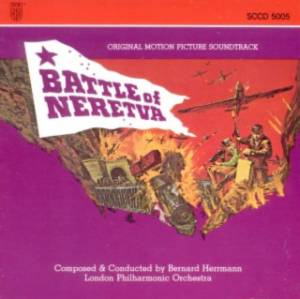As far as the mainstream of film journalism is concerned, Bernard Herrmann vanishes from history for the decade between his final successful work with Hitchcock (Marnie, 1964) and his last score of all, Taxi Driver, (1975). In-fact, with quality orchestral scores increasingly out-of-favour in mid-60's Hollywood, Herrmann had relocated to London, from where he worked on a succession of interesting but generally little known films.
Battle of Neretva dates from 1969 (the original title of the film is Bitka na Neretvi) and qualifies as what was once disparagingly referred to as a euro-pudding; a large-scale film funded by companies from several European countries and designed in such as way as to appeal to as many markets as possible. The result was often a bland, compromised muddle of a feature which pleased no one. Bitka na Neretvi starred Yul Brynner, who through the Magnificent Seven series had become a much bigger star in Europe than the States, Curt Jergens, Franco Nero, Hardy Kruger, Silva Koscina, Sergei Bonarchuk and Orson Welles. The film was financed by seven companies, three of which were Yugoslavian.
In telling the story of Tito's partisan's heroic defence of Yugoslavia against a massive Nazi Panzer-led invasion, Bitka na Neretvi was intended to be part of the wave of super-war-epics which invaded cinemas the 60's, the most obvious comparison being The Battle of the Bulge (1965), for which Benjamin Frankel wrote an excellent score recently re-recorded virtually complete on CPO. Produced on a colossal scale, Bitka na Neretvi features 10 000 extras, 1000 cavalry, and the destruction of four specially constructed villages, one fortress and a 400-foot bridge. Released in an epic 175 minute version in some parts of Europe, cut to 134 minutes in others, the movie was butchered into a 102 minute version for English language release.
It was at this point, when Bitka na Neretvi became Battle of Neretva, that Bernard Herrmann became involved, assigned in 1971 to compose a new score, the original by Vladimir Kraus-Rajteric presumably no-longer making musical sense following such heavy cutting. Perhaps it was the presence of Orson Welles that led to Herrmann's involvement, but however it came about, he wrote a fine replacement.
Although the notes do not say so, given the 35 minute running length and the division of the music into 12 cues, typical indicators of soundtrack albums of the period, this current Southern Cross CD appears to be a reissue of the music from the original soundtrack LP. Given that it is credited as composed and conducted by Bernard Herrmann with the London Philharmonic Orchestra, an orchestra with which Herrmann re-recorded much film music in the late 60's and early 70's for LP issue, it may well be that the cues here were specially recorded for album release. It would certainly explain the excellent sound, for all Herrmann's London Philharmonic LPs from this period have superlative sound, a feature carried through for this first-rate digital remaster. The album is rich and full, without a hint of distortion or deterioration, and with hiss levels so low one really has to turn the volume up for it to be noticeable at all.
The opening 'Prelude' is a short but furious overture, commencing with blistering snare and climaxing with a flourish of almost Rózsaian brass. 'The Retreat' begins in a brooding, distant fashion, developing into a slow march of grinding, defeated resignation. It is Herrmann at his most powerful, a cue that bar the more conventional orchestration would not have been out of place in Mysterious Island (1960). 'Separation' introduces an understated lament in the strings, woodwinds carrying the melody as high strings play against the cellos. 'From Italy' is a love theme in more conventional mode, and will sound very familiar to fans of the composer, being an orchestral treatment of the main theme from the Clarinet Quintet - Souvenirs de Voyage, a piece written in January 1967. 'Farewell' offers a more impassioned version of the theme from 'Separation', while 'Pastorale' echoes Herrmann's great melancholy melodies from The Devil and Daniel Webster (1941) onwards, wringing one more variation from the template.
'Chetnik's March' features massed percussion and heroic brass, and again may make one think of Miklós Rózsa. Herrmann could certainly have taught Hans Zimmer a thing or two about what an army going into battle should sound, while the 'Partisan's March' is a more 'Western' sounding piece, closer to The Great Escape (1963) than the East European-flavoured music which has come before. 'The Turning Point' is a savage and extended battle sequence which matches the corrosive emotional intensity of Vertigo (1958) with the propulsive rhythmic drive of North By North West (1959). Alone it makes the album worth the price of admission for the serious Herrmann collector. After this the 'Victory (Finale)' is a sober affair. There is no elation only relief that for now the killing is over. The last track is undocumented, and offers a lighter, orchestral-pop version of the first love theme. Complete with wistful accordion, this could almost be a cue from Henry Mancini's Charade (1964), and certainly comes as a surprise on any album bearing Bernard Herrmann's name.
No one who loves Herrmann's music will want to be without this album. It's a fine score in excellent sound. Now it would be interesting to see if someone could unearth the complete tracks, or if some enterprising company would care to release a double sided DVD, with the English language Battle of Neretva on one side, and the original Bitka na Neretvi on the other. Both, it hardly needs say, with isolated score tracks.
Gary S. Dalkin





